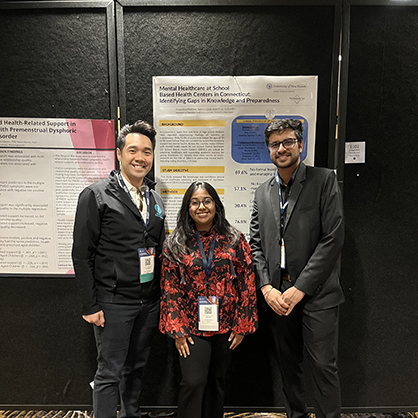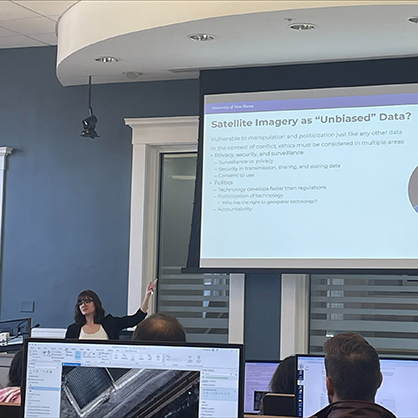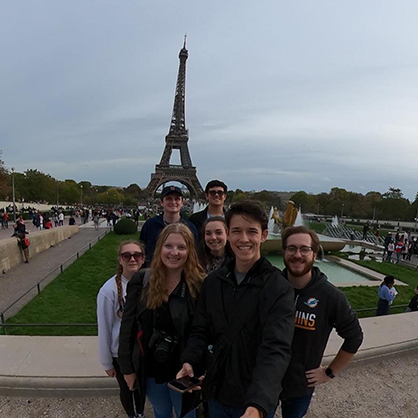“Challenge by Choice”
- This was a concept taught to me through the FLEx program offered by the University, and it really brought me to understand the mindset of how to approach your goals and the challenges they may bring.
- Many times during my project, I was intimidated by the amount of work that it would take to complete my research, dissections, or sample analysis, etc. However, I was able to make these tasks more approachable by setting small, individual goals that would eventually build up to a larger one. For example, I would set a mini-goal to complete 4-5 fish a day to achieve the goal of dissecting 20 fish by the end of the week. This same method can also apply to literature-based research as well, perhaps building off of how many pages to write throughout the week to finish a paper in the next month or so.
- In summary, you choose what challenges you set for yourself, their difficulty, and the most successful way to approach them.
Sheesh, that was a lot of words. Everyone, break for coffee. Or tea. Or cocoa. Or water.
(Insert Jeopardy! music here)
Are you back? Maybe? Mostly? Fantastic! If you grabbed a glass of water, you get an extra two points. (The author did not get two points). So: the personal side of research. This may or may not include:
- Laughing
- Crying
- Listening to Michael Jackson in the lab
- Miscounting your samples and having a heart attack
- Thankfully, you watched Sesame Street as a child and you know how to count successfully
- Hitting your head on the wall because your sample won’t filtrate and you want to give up and go home
- Protein bar for dinner? Yes. Healthy? Eh, no
- Being humbled by locking yourself out of the lab and needing to call campus police to help you
‘Find balance’
With every studious, logical-based project, there will be, without a doubt, frustrations. While the research, for the most part, went smoothly and according to plan, there were a few hiccups along the way. Primarily, as I mentioned in previous entries, our filtration time. In the early stages of Project Go Fish, samples were taking roughly sixty minutes to filter through a buchner funnel. This would mean that it would take 1,200 hours to get everything done, and I, clearly, did not have that time.
So, after a few frustrating days, we eventually switched over to a funnel with a larger pore diameter. To prevent sample loss, we used two slips of Wattman filter paper instead of just one. There was also the use of 10% KOH instead of the original 30% that I was supposed to be using according to my method. Clearly, I must’ve missed an episode of Sesame Street.
Thankfully, this mistake actually proved to be beneficial, as according to a former student’s study, he found that using the 10 percent instead of 30 percent KOH helped preserve the microplastic particles and henceforth, data for analysis. In summary: similar to how DNA can mutate, these mutations, these mistakes we make in research can help find new insights and methods that we may not have seen the first time. In terms of advice, though, here is what I have to say:
Find balance. That’s it, basically. There is a difference between pushing and forcing. Yes, it’s important to try your best with your life, whether that be academically, professionally, or socially, but at the end of the day, you’re still a human being. You are not expected to keep pumping work out constantly, or producing something every single day.
‘I changed my perspective’
Addressing your everyday needs – drinking enough water, eating well, getting some movement in, sleeping enough, etc – this is how you will truly find and maintain success. While remaining disciplined in your work is important, you won’t be able to commit to it without addressing your foundational and essential necessities over the course of your life- this goes to anyone regardless of their position in life.
Lastly, there is one final key thing to tie this all together: perspective. If you don’t believe that you are capable of pursuing your objective, whether that be research or another long-term project, odds are that you won’t.
The world grants us opportunities, and you have two options when that happens: take them or watch as someone takes them instead. Which one of those happens is completely up to you, and, most interestingly enough, even if you show a shred of effort, chances are that you will end up succeeding in ways that you wouldn’t believe. For me, I didn’t think I could do SURF. I was a first-year student, bottom of the food chain, nutritional sciences major, and, frankly, very tired of anything related to the lab.
But look at what happened. I changed my perspective. Yes, I may be on the younger side, but how can I use that to my advantage? Nutritional Sciences: How can I apply that innovatively? Lab: well, that fluctuates, haha. Asking yourself questions gives you reason to pursue their answers, and, in turn, you will grow, even if you may not truly find what you were originally looking for.
A leader, a mentor, and a blogger
I started out in forensic sciences. A few months passed, and I quickly discovered that major was not for me. But after speaking about nutrition and exercise science with my adviser, I finally came to the understanding of what they meant when they said “passion.”
It was like I was hearing myself for the first time. Things flowed from me endlessly, and at the end of our discussion, he looked a little bit awe-struck. Passion is something you don’t stop. It won’t stop. Passion is what you will rely on at the end of every day to drive you forward even if it feels like you’re back where you started. It’s something you will give your mind, your heart, and a little bit of your soul to because you believe in its potential to grow through your actions. I didn’t have to have a “cool” major to fit into the school. I just had to be myself, through and through. So…who’s that?
It’s a nerd in a trench coat. A blogger. She likes lifting heavy things, and sometimes she can get a little loud when she’s passionate about something. Beatrice is also a baker, an artist, lover of photography, a small-time model, and your friendly neighborhood disaster. Currently, she is aspiring to be a leader on the University of New Haven campus, and she is planning on being a mentor for the 2023 FLEx program, following her time as a participant in FLEx in 2022. In terms of research, she is looking forward to presenting her findings to an audience as well as publishing a research article on microplastics to be peer-reviewed by the scientific community.
Beatrice is me, by the way. The author of this SURF blog, and one that will be posted on the first of September: The Part-Time Vegan. This is a bit of a shameless plug moment, but if you’re looking to make your college experience balanced, sustainable, and fresh, with new perspectives and thinking, tune in. The Part-Time Vegan is a collection of personal blogs, recipes, workouts, and other fun doodads and knick-knacks that perhaps the average blog wouldn’t contain in its Nutritional Facts.
‘Research isn’t just science and lab reports’
As my SURF experience comes to an end, I would like thank my mentors, Dr. Jean-Paul Simjouw and Dr. Christian Conroy, for their amazing contributions to this project, and for being perhaps some of the kindest, down to earth, and chillax professors I have ever had the privilege of meeting.
Additionally, I would like to acknowledge the ever so lovely members of the SURF Program board who have believed in me from the start of this project and offered their unconditional support throughout the duration of the program.
Finally, I’d like to congratulate my fellow SURF-ers on a job well done. While not all projects have been completed, I am very, very proud of everyone who participated this year as we have not only grown in knowledge, but in character as well. Thank you all for being here and for showing me that research isn’t just science and lab reports.
It’s growth, and I think that’s what we strive for.
With peace, love, peanut butter, and many, many hugs, I’ll see you on campus soon.
Beatrice Glaviano ’26, a nutrition sciences major, is a member of the University’s Summer Undergraduate Research Fellowship program.



